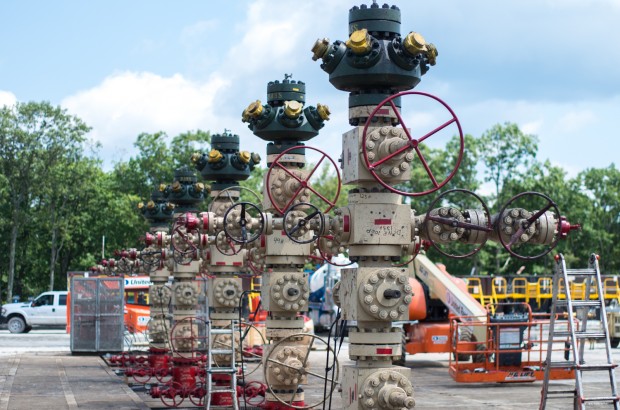Pennsylvania natural gas production still growing, but pace has slowed
-
Marie Cusick

Joe Ulrich / WITF
Pennsylvania natural gas production is still growing, but the pace has slowed significantly.
Natural gas production in Pennsylvania continues to grow, but its rate of growth has slowed significantly in recent years.
During the first six months of 2017 statewide natural gas production grew by about 3 percent, compared to the same time period in 2016, according to Matthew Knittel, director of Pennsylvania’s Independent Fiscal Office (IFO).
The IFO issues quarterly reports on natural gas production and also analyzes the revenue from the impact fees, which gas drillers pay on a per-well basis.
Knittel says for example, in 2012, when the IFO began tracking production, the growth rate was very strong. In 2013, statewide gas production grew by 52 percent. The following year it was up 31 percent.
He says that pace can’t be sustained forever. Natural gas wells tend to be most productive in the beginning and then dramatically taper off. So in order to keep production up, drillers need to keep putting in new wells to replace the older ones.
“The second item driving the dynamic is the fact that there’s a lot of wells that have been drilled that are in inventory and haven’t been produced,” says Knittel. “We believe producers are waiting for prices to recover in order to bring production back online.”
Knittel expects production may tick back up faster as new pipelines come into service, which will spur companies to bring more wells into production.
The U.S. Energy Information Administration, which is the indepedent statistics arm of the Department of Energy, recently released an analysis showing gas companies are starting to see higher prices for their product, as new pipelines come online in the Northeast.
At the end of July, for example, the natural gas price at Dominion South, a trading at a hub near Pittsburgh, was at $1.85 per million British thermal units, which is about $1.00 lower than the Henry Hub (a national benchmark price set in Louisiana) but the difference has been narrowing.
Among states, Pennsylvania remains the second-biggest producer of natural gas, after Texas.
David Spigelmyer, president of the gas trade group, the Marcellus Shale Coalition, said in a statement that the industry remains hopeful about the future.
“While our industry has cautious optimism about what will be a long and difficult recovery, the immensely challenging market conditions along with intense competition among energy-producing states can’t be lost on anyone.”
















